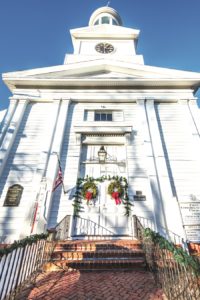When the churches on the Outer Cape had to suspend all in-person activities in March 2020, there was a period of uneasy quiet for both leaders and members. For a time, said the Rev. Terry Pannell, rector of the Episcopal Church of St. Mary of the Harbor in Provincetown, “it was like living in a twilight zone.”
What happened next, he says, was that the people of St. Mary’s had to “re-evaluate what it means to be a community of faith.”
Pastor Sieglinde Rogers of the United Methodist Church in Wellfleet reported a similar experience. “What would enable each member to be able to be seen, to be able to be heard,” she remembers wondering, “when people could not get together to see and hear each other?”
Creativity and resilience characterize the answers from pastors and members of five area churches here.
Pastor Frank Alexander of Grace Chapel Assemblies of God in South Wellfleet says the pandemic “hit us like a ton of bricks.” At first, his instinct was “to wrestle with what role the government should play.” But soon, he says, “we shut down,” as did the First Congregational Church in Wellfleet, “without hesitation,” says the Rev. Sheila Rubdi.

Churches here seem to have been untouched by national controversies over mask and vaccine mandates. From the beginning, their leaders say, they have followed official guidance on masks, personal distancing, ventilation, hygiene, and vaccinations. One way to see the evolving rules, says Rubdi, is to look at them as providing “a gift of readiness.”
But the reality of the health threat came early for Pastor David Brown of the Chapel on the Pond in North Truro. He was diagnosed with Covid-19 just as the vaccine was being rolled out. After a two-week quarantine, he was rushed into intensive care at Cape Cod Hospital.
“I thought I was going to die,” he says, and his parishioners, eight of whom also tested positive for the virus, feared the same. Everyone recovered. Such a deep and direct experience of the virus “brought us closer to each other,” Brown says.
The closures also brought financial woes to churches. Weekly donations along with income from suppers, craft sales, art fairs, and the rental of church spaces for events was lost. Pastor Rogers says that the Methodist Church in Wellfleet was, and still is, operating at a deficit, and while other church leaders are not as blunt, all agree they have faced financial challenges.
Government aid helped make up for the shortfall, through the Paycheck Protection Program. “The PPP really helped us,” says Pastor Alexander.
Like businesses, churches gradually found ways to reconnect members through technology. Prerecorded and live-streamed Sunday services, Zoom Bible study, and YouTube videos of sacred music are the kinds of changes that church leaders say they think will stick, even after the pandemic definitively ends.
Frank Vitek, a parishioner at the Wellfleet Congregational Church, says he came to enjoy the church’s videotaped services. “Especially when we were traveling,” he adds. “They made a big difference.”
Rector Pannell and Pastor Rubdi both say that streaming their services has meant reaching people beyond their small church communities. St. Mary’s now has viewers in Northern Ireland and Florida; Wellfleet’s Congregational Church has received appreciative letters from viewers in Scotland and California.
Churchgoers’ readiness to go with the flow sometimes surprised their leaders. Early in the pandemic, Pastor Rogers asked one of the church trustees, Rich Murphy, what he missed most. His reply: the ringing of the bell on Sunday. Murphy was invited to assuage his desire even though the church couldn’t be open.
That Sunday he did, and by the Sunday after that, as congregation members heard about what he was doing, or heard the bells themselves, they began to gather on the small patch of lawn in front of the church to listen. Those who stopped weren’t always church members, Rogers says; almost everyone who walked or drove by would stop to listen.
Karen Murphy, Rich’s wife, began to lead Sunday morning devotions on the lawn, with everyone masked and maintaining proper distance. Realizing what was happening with what she called “energizing spontaneity,” Rogers joined in, and eventually began to preach from the front steps.
Some forms of fellowship were harder to reconstruct. Dr. Margaret Tilton runs a weekly walk-in detoxification acupuncture clinic at Wellfleet’s Congregational Church. She worries about those struggling with a wide range of addictions and other challenges related to stress and depression, who were unable to visit the clinic for a long stretch from March 2020 to August 2021.
The cessation of weekly suppers at Grace Chapel meant more people faced food insecurity.
There is a kind of family resemblance among the congregations’ responses to the pandemic. Love is one theme. “The faith community I serve leaned in and really loved on each other,” says Pastor Rogers.
Strength in togetherness is another theme. “The virus has brought us closer together,” says Pastor Brown. His feelings are echoed by Rubdi: “The people rallied round. They were brilliant.”
“Last Christmas was really hard,” Pannell says, and “Easter was particularly difficult.” And yet, he adds, the disruptions of tradition have helped members of his congregation “to see the world with an appreciative eye.
“Adversity,” Terry Pannell concludes, “can make you stronger and more faithful.”
